It seems we can’t find what you’re looking for. Perhaps searching can help.


Tag: bigcommerce enterprise




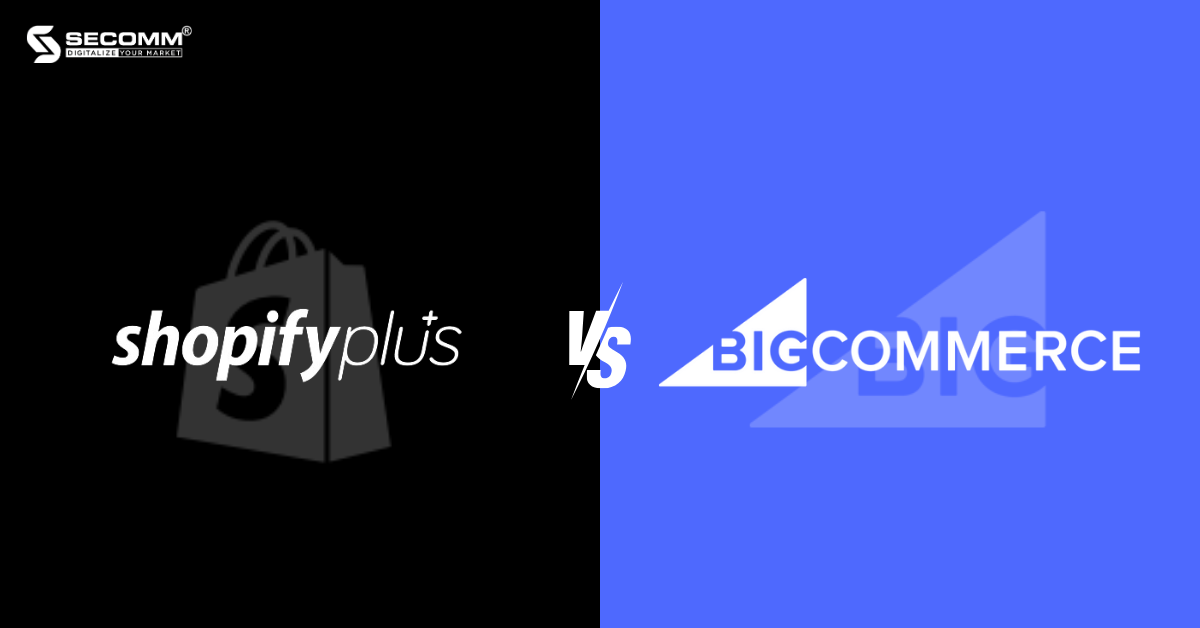
SHOPIFY PLUS VS BIGCOMMERCE ENTERPRISE: FULL COMPARISON 2024
In today’s eCommerce landscape, it isn’t just open-source platforms that can meet the complex development and customization needs of large-scale enterprises, but SaaS platforms are also steadily rising with significant improvements. Among them, two SaaS platforms designed specifically for large enterprises are Shopify Plus and BigCommerce Enterprise.
However, these two platforms have many key differences. This article aims to clarify the pros and cons of each platform and compare the differences between the two platforms to help you — as a business leader — make well-informed decisions.
Learn more: Shopify vs BigCommerce: Which platform is right for you?
Shopify Plus vs BigCommerce Enterprise: Pros and Cons
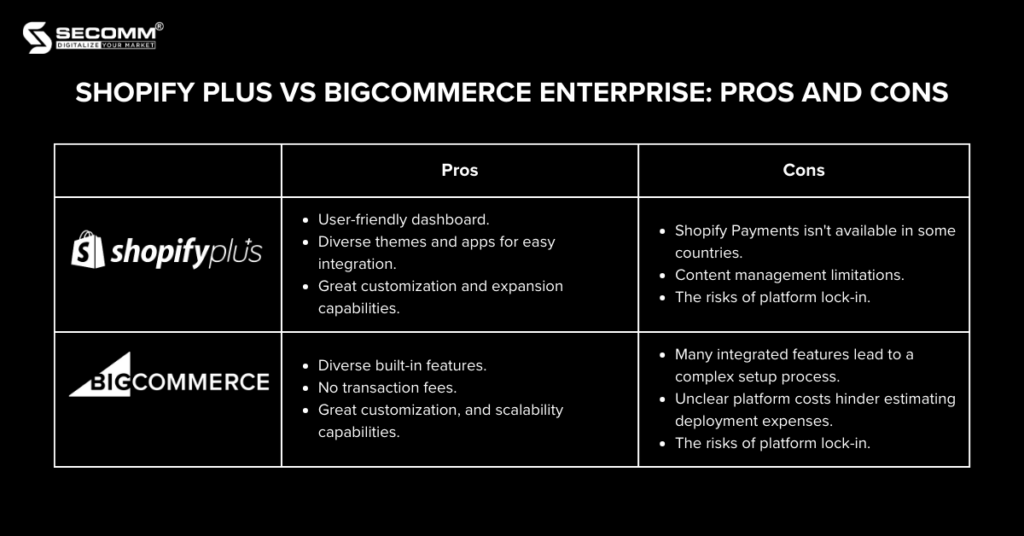
Shopify Plus vs BigCommerce Enterprise: Quick Comparison
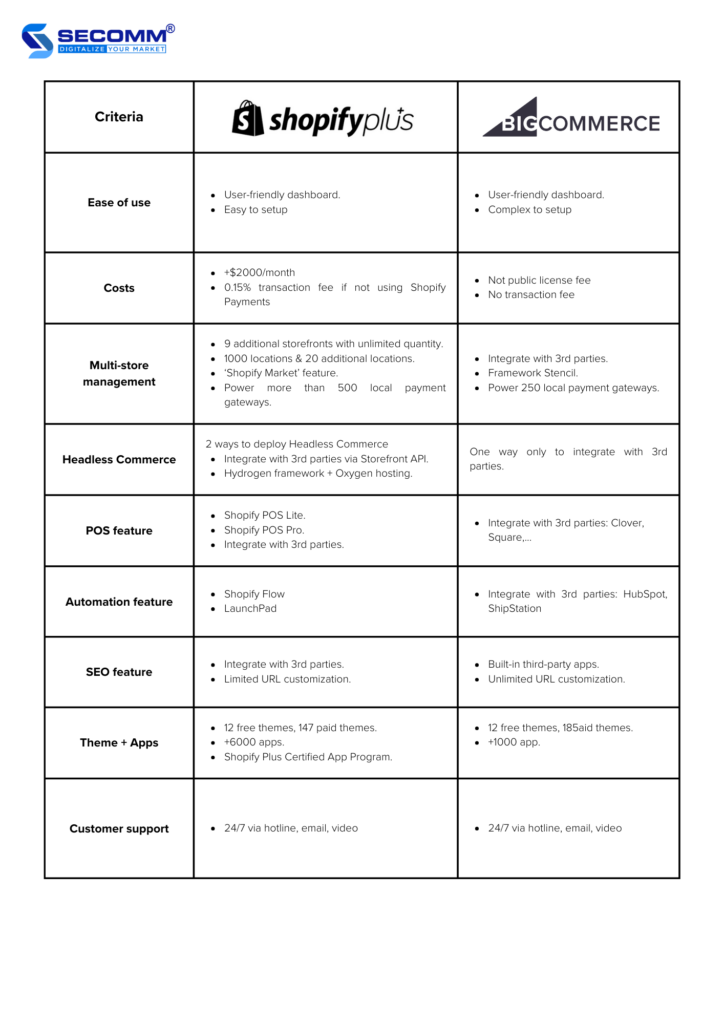
Shopify Plus vs BigCommerce Enterprise: Detailed Comparison
Ease of Use
Both platforms are recognized for their user-friendliness compared to open-source platforms. Their intuitive dashboard and user-friendly navigation, along with features like drag-and-drop editing, extensive documentation, and 24/7 support, make them accessible for users of varying technical expertise.
However, Shopify, known for its inherent user-friendly design, ensures that users, whether using the Plus version or the regular ones, can easily explore and set up their eCommerce website with efficiency.
Both these two premium solution platforms — which are Shopify Plus and BigCommerce Enterprise — cater to the deployment needs of large enterprises, these platforms offer advanced features and technologies that require some learning.
For example, the ‘Plus’ users need to grasp the Liquid template language, while those opting for the ‘Enterprise’ may benefit from understanding the Google Cloud Platform for optimizing website performance.
BigCommerce, renowned for its built-in features, continues this trend with the ‘Enterprise’ version. Some features may suit specific businesses but might be unnecessary for others. While BigCommerce allows flexibility for customizing and configuring these advanced features, it can introduce complexity and intricacy into the setup process.
Pricing
Similarly to other premium solutions on SaaS platforms, the license fee will depend on the deployment requirements and the current scale of the business. BigCommerce doesn’t disclose the fee publicly, requiring businesses to directly contact the platform for tailored consultation and pricing.
On the other hand, Shopify Plus has a license fee starting at $2000 per month. Once you reach a monthly revenue threshold of $800,000, the platform fee becomes revenue-based, amounting to 0.25% of monthly revenue, capped at $40,000 per month or $480,000 per year.
Considering transaction fees is also important. While BigCommerce doesn’t charge transaction fees, Shopify Plus charges a 0.15% transaction fee for not using Shopify Payments.
To estimate deployment costs effectively, you should partner with development agencies and engage in detailed consultations with BigCommerce or Shopify for comprehensive guidance.
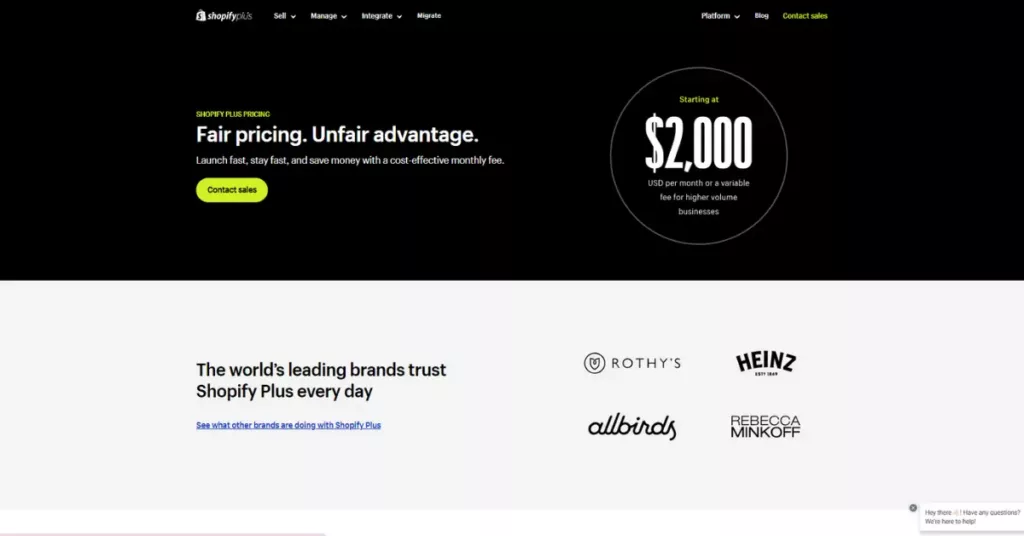
Features
- Multi-store management
For large enterprises, the multi-store management feature is crucial and a primary consideration when selecting an eCommerce platform to sell globally. To engage in sales across various markets worldwide, your eCommerce website needs to be crafted to suit the preferences of each target audience in different markets.
This involves addressing issues related to language conversion, currency units, and payment methods with flexibility. Moreover, stores should be administered efficiently in a centralized manner rather than separately.
Shopify Plus allows you to create up to 9 additional storefronts alongside the main storefront at 1000 different inventory locations and 20 additional inventory locations. All these storefronts can be centrally managed through a single dashboard.
Plus, the Shopify Market feature will help you select the markets you want to sell in. The system will then automatically convert and manage multiple languages, currency units, shipping options, and payment methods based on the user’s IP address. Currently, Shopify Plus supports a range of local payment gateways, and you can refer to the provided list.

BigCommerce Enterprise doesn’t provide many solutions or features for global selling. Instead, it allows you to deploy multiple stores within the platform and then integrate with 3rd-party PIM solutions to manage data across these stores.
Another option is to leverage the BigCommerce Stencil framework to tailor content language for each local market. Also, the Enterprise version supports multi-currency payments through more than 250 local payment gateways.
- Headless Commerce
The demand for adopting Headless eCommerce is on the rise, especially among large enterprises seeking to deliver a seamless and optimized experience for their customers. Both Shopify Plus and BigCommerce Enterprise offer effective solutions for going Headless.
BigCommerce Enterprise allows you to integrate with various frameworks (Next.js, Gatsby.js, Nuxt.js), APIs (REST, GraphQL), and your preferred or previously used tools.
When using Shopify Plus, there are three approaches. You can use the Storefront API to connect and develop with your preferred frameworks, hosting solutions, and tools. Or, you can leverage Shopify Hydrogen framework and Oxygen hosting to facilitate a headless eCommerce website flexibly.
- POS (Point of Sale)
Just like their regular pricing plans, both the ‘Enterprise’ and the ‘Plus’ include Point of Sale (POS) features for eCommerce transactions, catering to both online and offline stores, as well as Omnichannel operations.
POS can be configured on various devices like mobile devices (tablets, smartphones), and other hardware like cash registers and barcode scanners.
BigCommerce Enterprise offers smooth integration with third-party POS systems like Square, Vend, Clover, and Heartland Retail. It’s good for those who already using POS software from these third-party providers.
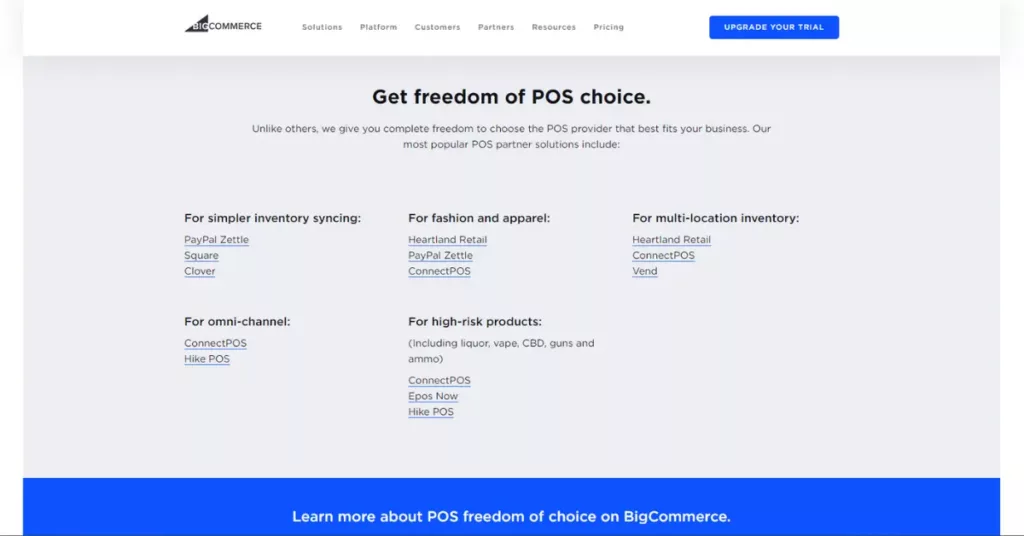
For Shopify Plus, beyond the option to integrate with third-party POS systems like BigCommerce Enterprise (Clover, Square, Zend), Shopify offers its own Shopify POS solution, available in two plans:
- ‘POS Lite’ plan, providing basic integration
- ‘POS Pro’ plan, priced at +$86/month for the first 20 locations for Shopify Plus businesses.
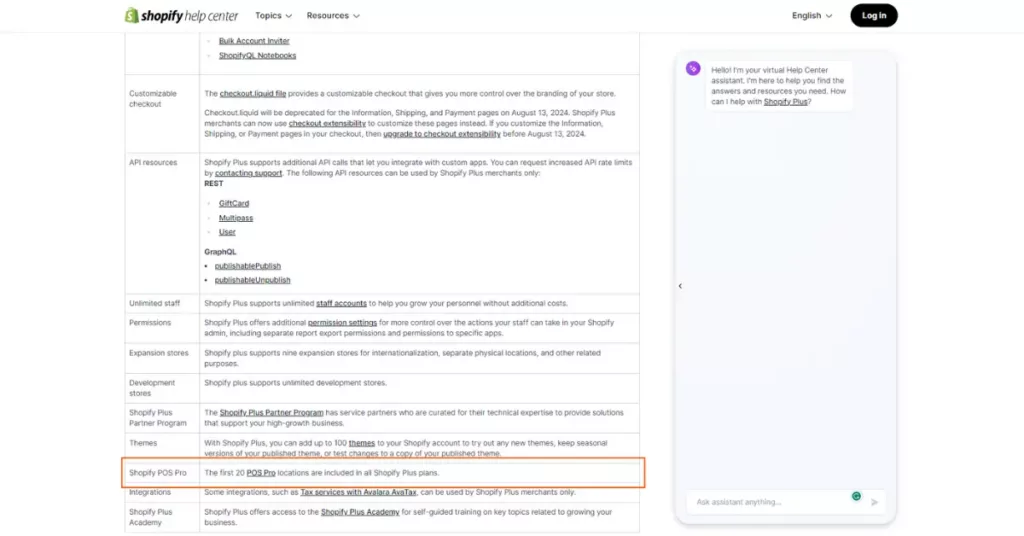
- Automation
Both ‘Plus’ and ‘Enterprise’ offer tools and solutions to help you automate your eCommerce website operations.
Shopify Plus offers an exclusive solution, Shopify Flow, and LaunchPad, allowing you to automate routine tasks and set up automated workflows for tasks like email marketing campaigns or new product launches.
On the other hand, BigCommerce Enterprise takes a different automation approach which enables you to smoothly integrate with 3rd-party apps. Some of them are HubSpot, Avalara, ShipStation, etc.
- SEO
SEO plays a crucial role in improving the search visibility of an eCommerce site and attracting potential customers. Both platforms offer features to enhance SEO efforts.
The ‘Plus’ stands out for its user-friendly interface and an integrated app ecosystem that can enhance SEO, incorporating tools such as Google Search Console and Analytics. However, it comes with limitations in URL control and customization.
The ‘Enterprise’, on the other hand, provides more versatile SEO capabilities, including complete control over URLs and integration with applications like Google Search Console and Analytics. It makes the process more intricate compared to Shopify Plus, involving additional setup operations.
Themes & Add-ons
- Themes
Shopify Plus offers businesses approximately 12 free themes and 147 paid themes, with prices ranging from $150 to $380 per theme. On the other hand, BigCommerce Enterprise provides around 12 free themes and 185 paid themes, with prices ranging from $150 to $400 per theme.
Both platforms offer a wide range of visually appealing and mobile-friendly theme options. While the ‘Enterprise’ themes are characterized by elegant, tidy, and modern designs with highly customizable features, the ‘Plus’ themes can meet higher requirements for user experience, making navigation easier.
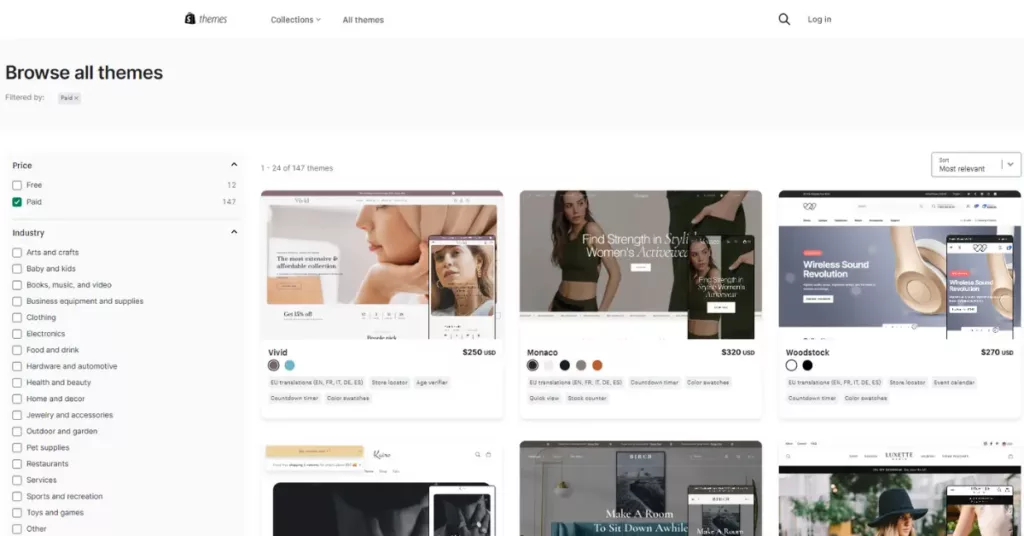
- Add-ons
To facilitate efficient eCommerce deployment, the two provide vast app stores and extensions, tailored for ‘Plus’ and ‘Enterprise’ businesses. While both platforms offer free versions, access to comprehensive features requires a modest monthly fee.
Shopify Plus boasts over 6,000 apps and extensions, while BigCommerce Enterprise has around 1,000. This can be explained by Shopify’s widespread popularity among businesses and developers globally, providing them with ample documentation and resources for app and extension development, including the Shopify Plus Certified App Program.
Customer Support
For businesses that are ready to deploy the ‘Plus’ or the ‘Enterprise’ solutions, the demand for technical support and efficient eCommerce website operations is significant.
Both platforms receive high praise for their customer service. They offer 24/7 support via hotline, email, and video available in multiple languages. However, if you need specialized and complex technical support, Shopify Plus may be the preferable choice.
Final Thoughts
In the competitive business landscape, selecting the right platform for launching an eCommerce website is an important decision. Both Shopify Plus and BigCommerce Enterprise offer distinct advantages and cater to various business models.
Regardless of the platform chosen, you should prioritize the development and delivery of an exceptional shopping experience for your customers. eCommerce platforms serve as tools, and the ultimate key to success lies in an effective deployment strategy and great collaboration with a proficient team.
With extensive experience helping numerous businesses deploy diverse eCommerce development projects on both Shopify Plus and BigCommerce Enterprise, SECOMM boasts a team of seasoned experts capable of collaborating to create exceptional eCommerce experiences and help you enhance your brand positioning.
Reach out or directly call the hotline at 028 7108 9908 to explore how SECOMM can contribute to optimizing the potential of Shopify Plus and BigCommerce Enterprise for enduring your business success.
 2
2

 4,681
4,681

 0
0

 1
1
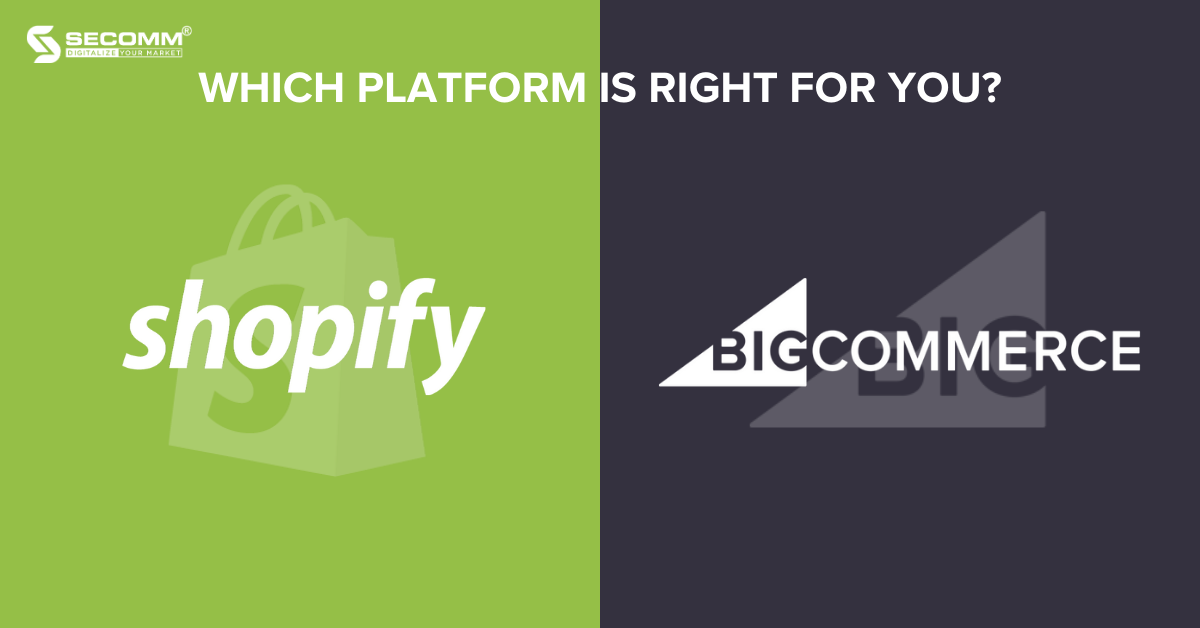
SHOPIFY VS BIGCOMMERCE: WHICH PLATFORM IS RIGHT FOR YOU?
In recent times, SaaS platforms like Shopify and BigCommerce have gained popularity thanks to the growing demand for eCommerce. While BigCommerce currently supports over 45 thousand active online stores globally, Shopify surpasses it with around 4.5 million active websites. Although Shopify and BigCommerce share typical features of SaaS platforms, there are notable differences between the two.
This article will compare the distinctions between Shopify and BigCommerce, providing valuable insights to help you, as a business make informed decisions quickly.
Learn more: Shopify Plus vs BigCommerce Enterprise
Shopify vs BigCommerce: Pros and Cons
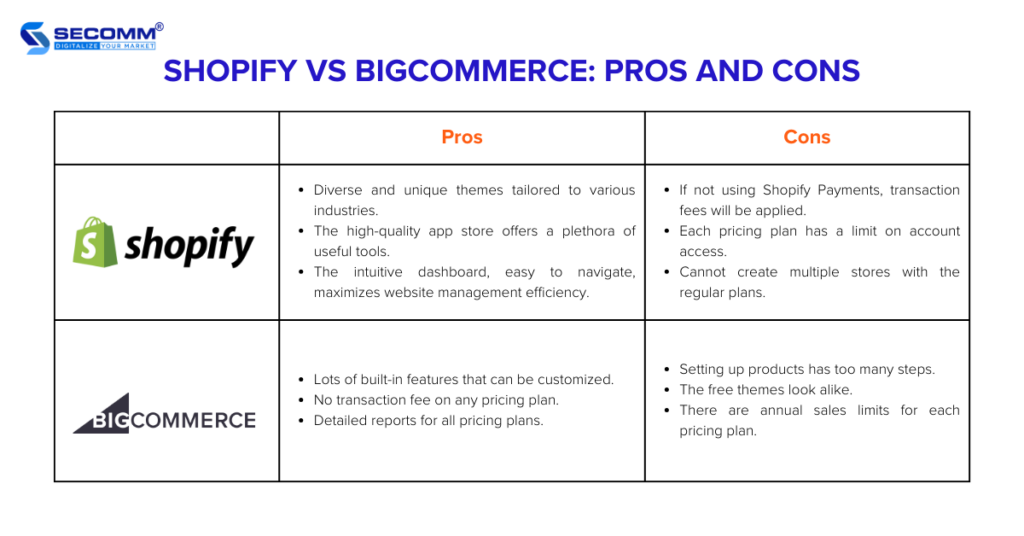
Shopify vs BigCommerce: So sánh nhanh
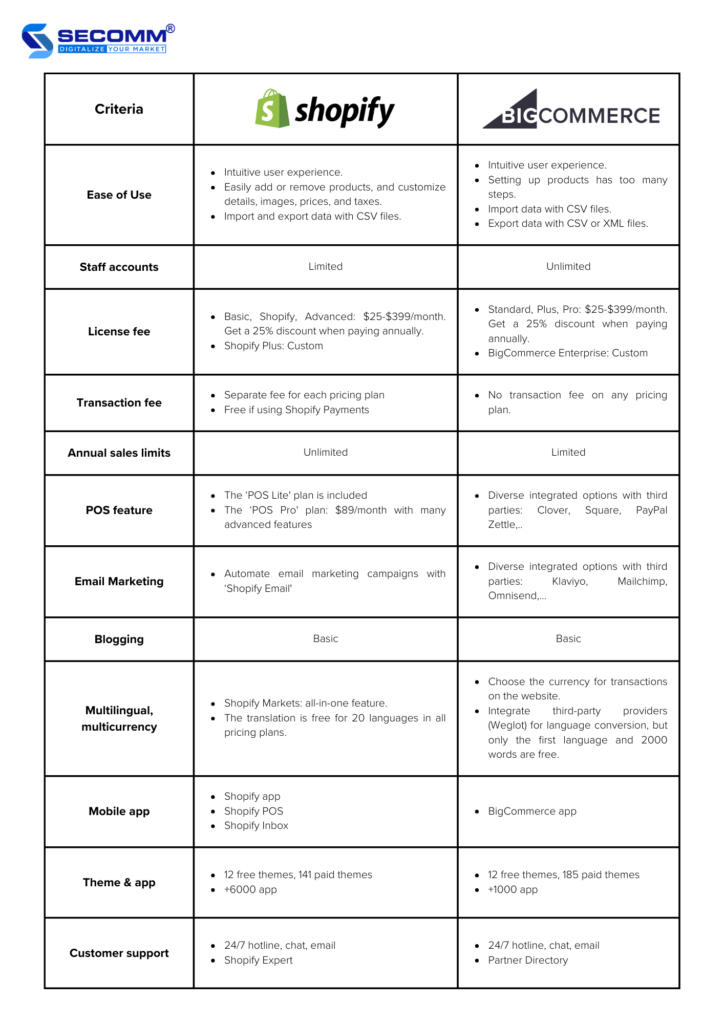
Shopify vs BigCommerce: Detailed Comparison
Ease of Use
New businesses often find Shopify more user-friendly than BigCommerce when it comes to setup and usage. Adding or removing products, customization, and editing layouts on Shopify are all straightforward tasks.
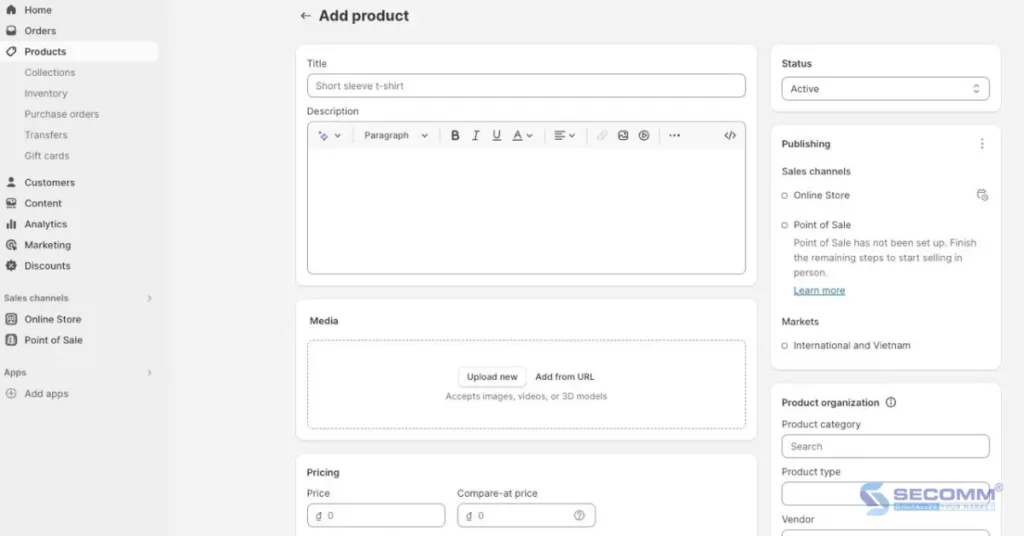
This doesn’t mean that the user experience of BigCommerce is less intuitive than the other. Both platforms are similar, providing drag-and-drop store editors, detailed documentation, and quick support. However, BigCommerce offers many built-in features that are expandable and customizable.
Users, though, may find themselves completing several different steps for each setup task, which can be overwhelming and time-consuming.
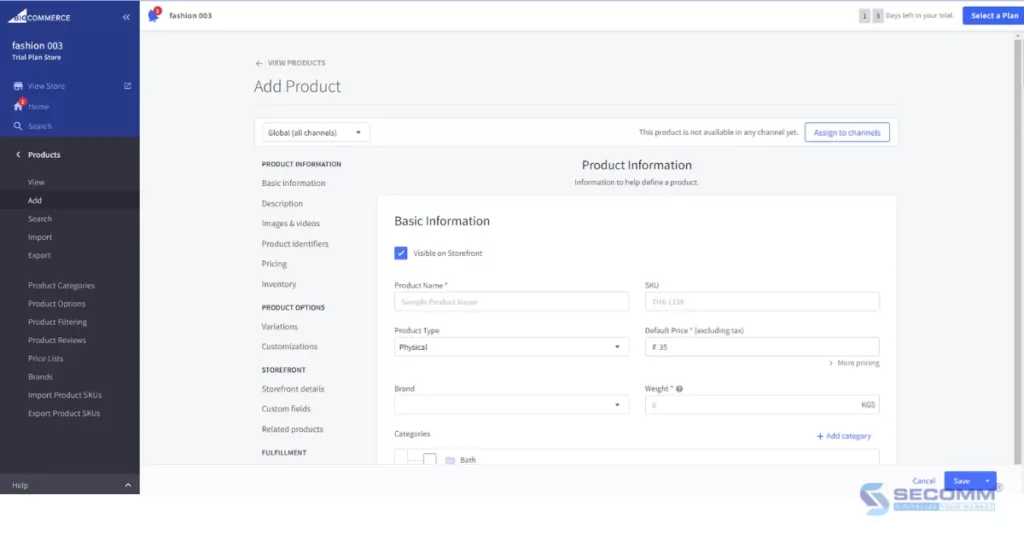
Staff Accounts
Shopify sets account staff limits for each pricing plan. Specifically, the Basic package allows 2 staff accounts, Shopify allows 5 staff accounts, and Advanced allows 15 staff accounts.
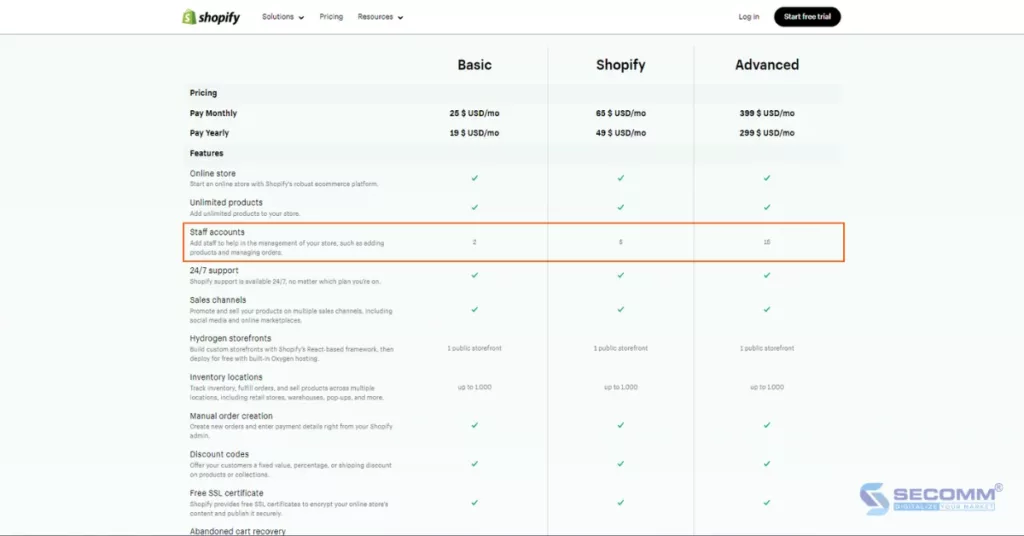
In this regard, BigCommerce has a significant advantage by providing unlimited account access for all solution packages. This flexibility can benefit businesses with many employees needing access to the eCommerce website system.
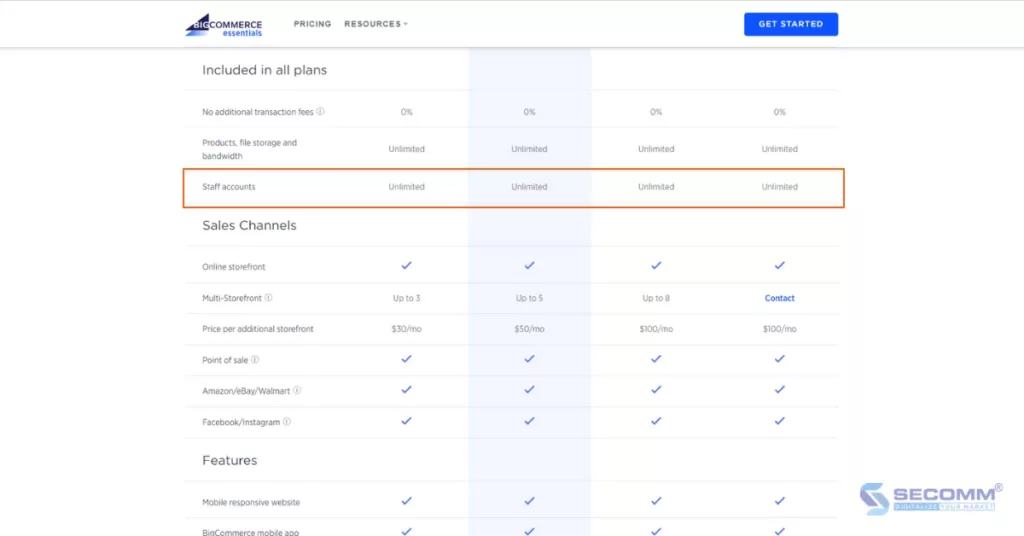
Pricing
- Pricing plans
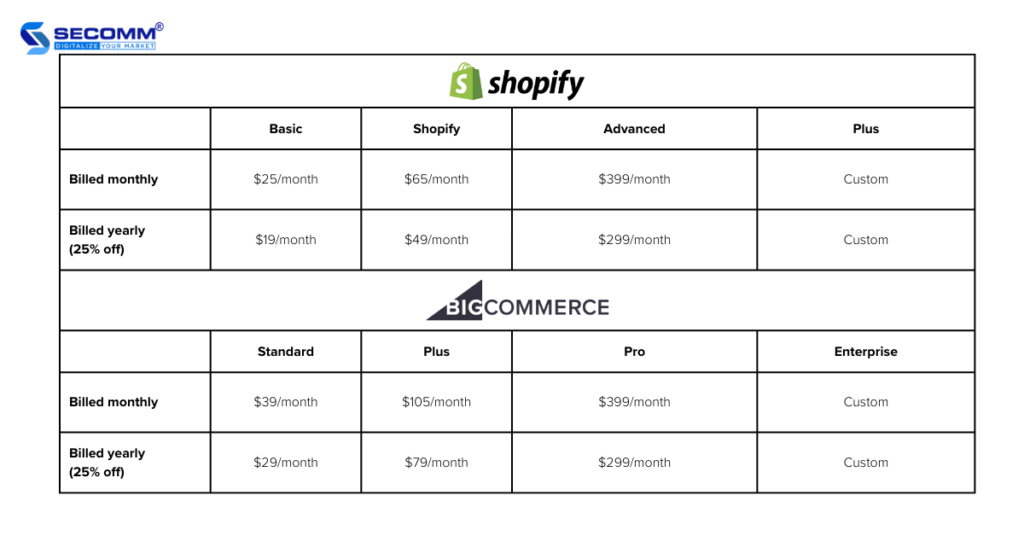
By using BigCommerce pricing plans, you can enjoy a 15-day free trial. The other offers a 3-day free trial for its 3 pricing plans, followed by a payment of only $1 per month for the initial 3 months. This gives you more time to experience the platform at a highly affordable cost.
- Transaction fee
The transaction fee is a drawback of Shopify. If you opt for third-party payment gateways, you’ll incur a transaction fee of 2%, 1%, and 0.5% for the Basic, Shopify, and Advanced plans, respectively. On the other hand, this fee is waived if you use Shopify Payments. However, Shopify Payments is limited to certain countries, some businesses may not have access. This, in turn, makes BigCommerce more appealing as it doesn’t impose transaction fees on any pricing plan.
Annual Sales Limits
BigCommerce sets annual sales limits to $50k for the ‘Standard’ plan, $180k for ‘Plus,’ and $400k for ‘Pro’, while the ‘Enterprise’ plan can be negotiated. To exceed these limits, you must upgrade to a higher pricing plan.
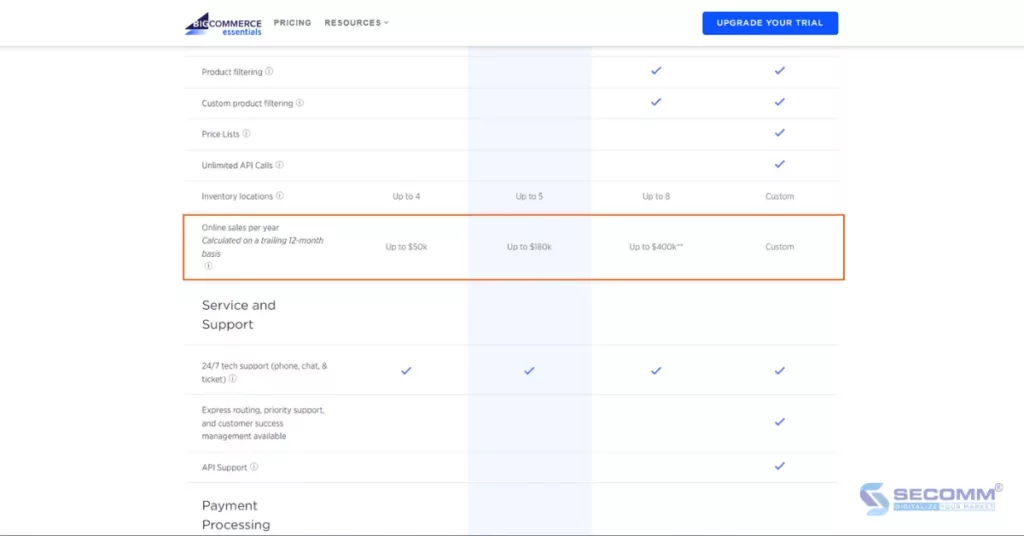
However, your business may not need the features offered in higher-tier plans and may be hesitant to pay additional fees for an upgrade. Therefore, the sales volume limit on the BigCommerce platform is a crucial factor that requires thoughtful consideration. In contrast, Shopify doesn’t impose any annual sales limits on any of its pricing plans.
Features
- Point of Sale (POS)
The POS feature isn’t limited to eCommerce transactions but also extends to traditional brick-and-mortar stores. Both BigCommerce and Shopify allow you to implement POS on mobile devices (smartphones, tablets) and other hardware (cash registers, barcode scanners).
To use POS with BigCommerce, you need to integrate with software like Clover, Vend, Square, PayPal Zettle, and others. Hence, if you are currently using a third-party POS system may appreciate the flexibility offered by BigCommerce.
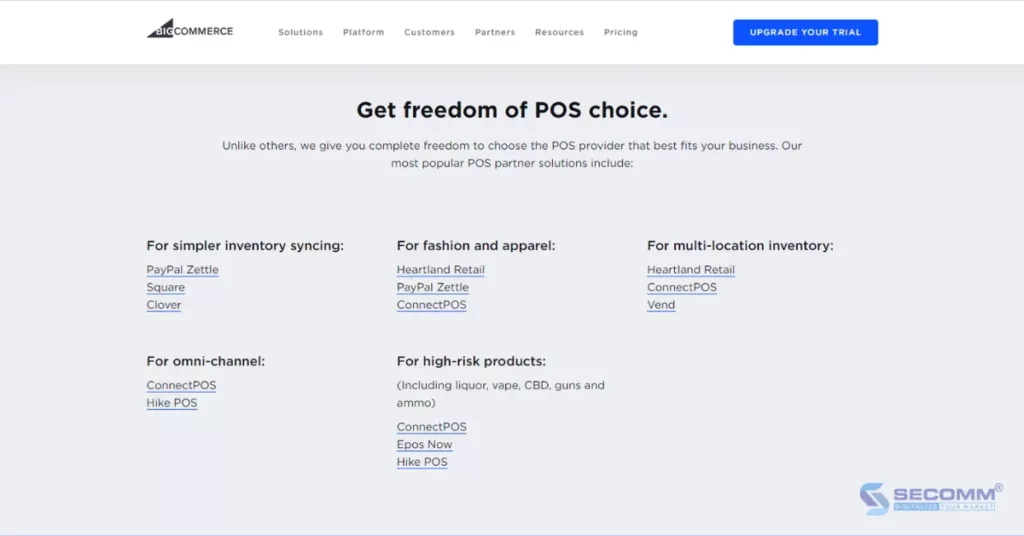
Conversely, Shopify offers built-in POS features, starting with the ‘POS Lite’ plan within its pricing plans. However, to access more advanced POS features, you can opt for the ‘POS Pro’ plan at $89 per month per location, added to the chosen pricing plan. If you choose the annual payment option, the ‘POS Pro’ plan is only $79 per month per location.
Shopify POS solution caters to diverse needs, including single-store transactions, multi-store transactions, event transactions, online and offline sales, as well as omnichannel operations.
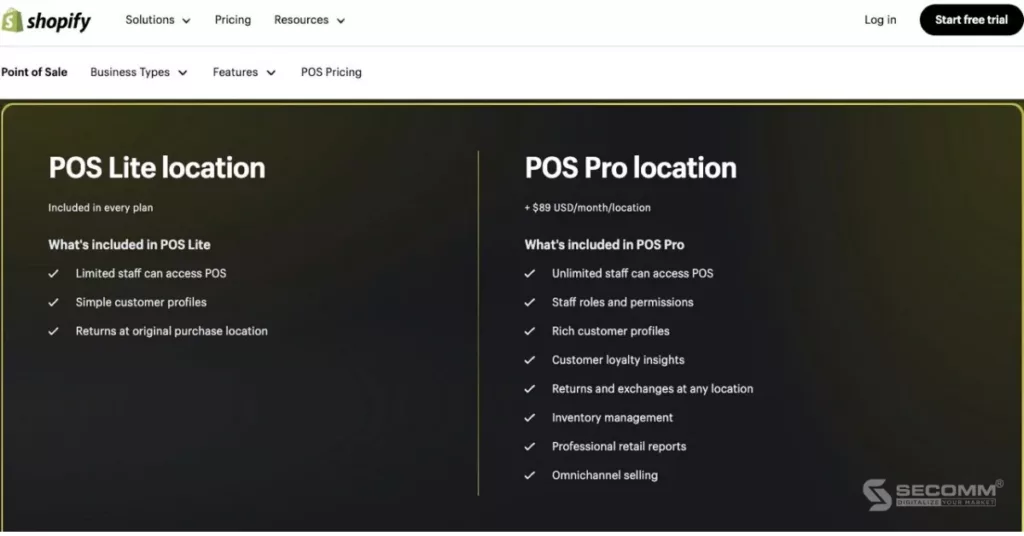
- Email Marketing
In eCommerce, email marketing is crucial when it comes to customer attraction and substantial sales growth. Hence, it’s a feature you should prioritize when selecting an eCommerce platform.
Beyond the Shopify POS solution, Shopify offers you the built-in Shopify Email feature, designed for Email Marketing campaigns and automating email processes (Welcome Email, Winback Email, Upsell Email).
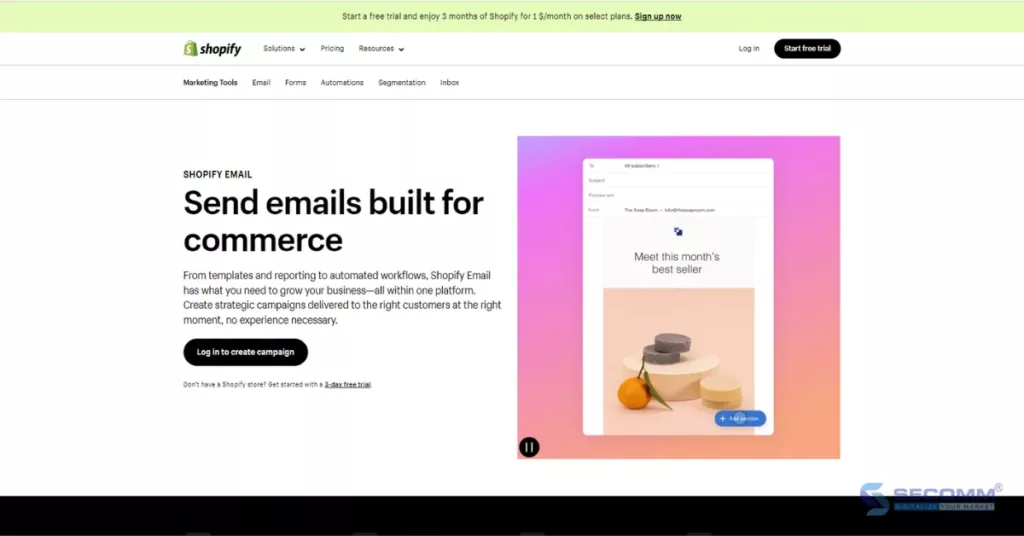
Meanwhile, for Email Marketing on BigCommerce, you need to integrate with third-party service providers like Klaviyo, MailChimp, Omnisend, and others.
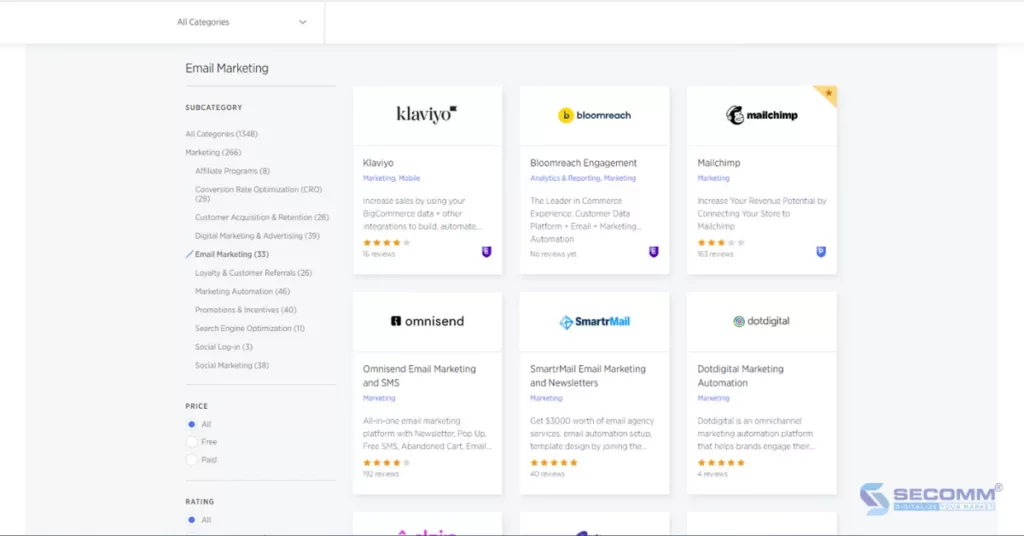
- Blogging
When you utilize blogging effectively, it can be one of the best sources to attract organic traffic. Both BigCommerce and Shopify come with built-in blogging features at a basic level, offering attractive templates that help you create SEO-optimized blog content to draw in potential customers. Moreover, you can seamlessly integrate with WordPress or other CMS platforms for more advanced blogging features
- Multilingual, multicurrency
Cross-border selling is currently a common goal for many eCommerce businesses. Fortunately, both Shopify and BigCommerce provide features and tools to help businesses expand into the global market
Shopify Markets, introduced in 2021, is a feature that allows you to select the specific markets you want to sell in. It’s an all-in-one feature that helps you centrally manage multiple local domains, languages, currencies, and payment gateways.
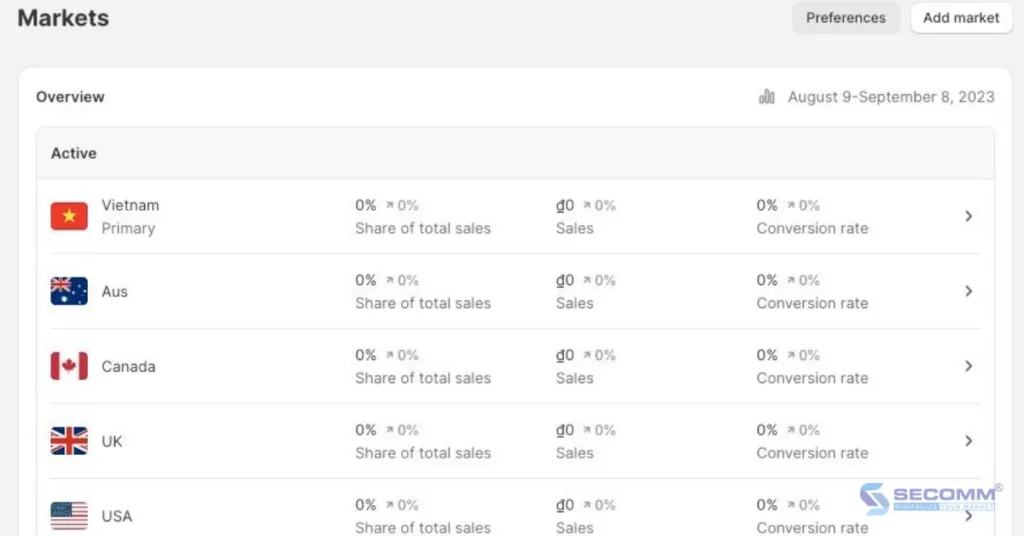
Plus, Shopify Markets utilizes the IP address of visitors outside the default ‘market’ that you previously defined to prompt them to select a location and the appropriate currency.
On the other hand, with BigCommerce, you can choose the currency for transactions on your eCommerce website instead of opting for a ‘market’ like Shopify. Additionally, the currency is automatically converted based on the customer’s IP address.
While language conversion capabilities are built into Shopify when the Shopify Markets feature is enabled, for BigCommerce websites, you’ll need to integrate with a third-party service to achieve the same, such as Weglot, which offers free conversion for 1 language and 2000 words. In contrast, Shopify provides free conversion for 20 languages across all pricing plans.
- Mobile app
While BigCommerce has only one app to help you manage sales, interact with customers, and access basic reports, Shopify you up to 3 apps to improve efficiency in eCommerce operations.
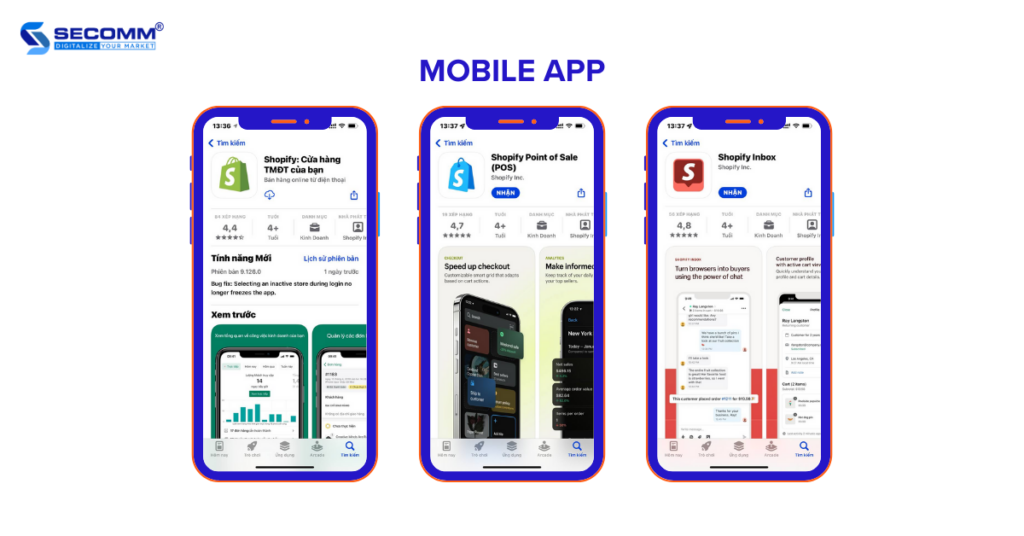
- Shopify: The main app for order and product management, along with viewing updated reports.
- Shopify POS: Manages online, offline, and omnichannel sales transactions.
- Shopify Inbox: Facilitates customer interaction, product sharing, and direct sales within the chat interface.
Themes & Apps
- Themes
Both BigCommerce and Shopify offer you a variety of free and paid themes. For BigCommerce, the platform provides 12 free themes, but in reality, there are around 5-6 distinct free themes as the layouts are quite similar. As for paid themes, BigCommerce has approximately 185 themes ranging from $150 to $400 per theme.
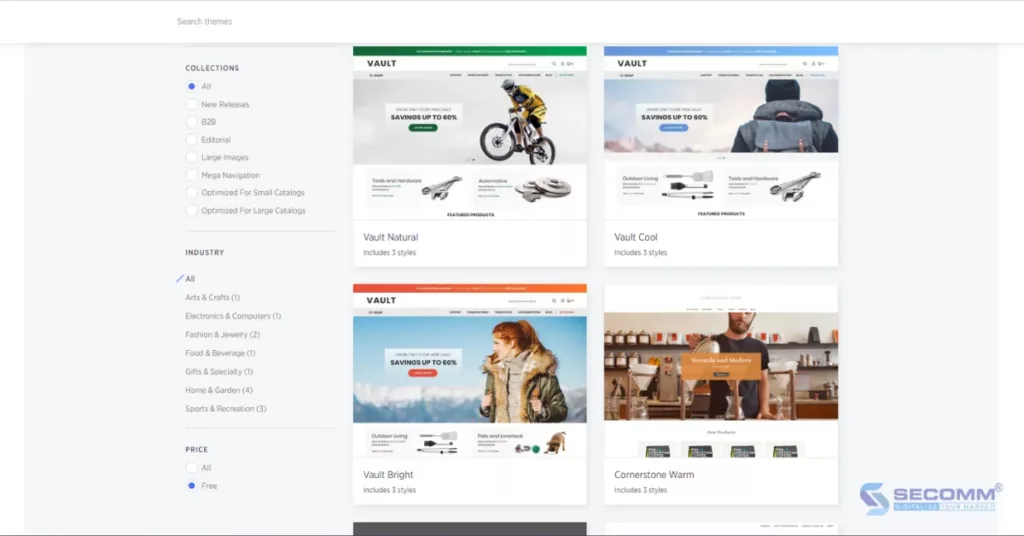
On Shopify, the platform offers 12 free themes and 141 paid themes with prices ranging from $170 to $380 per theme. Both Shopify and BigCommerce provide users with drag-and-drop theme editors to modify layouts, colors, fonts, and text sizes and add/remove elements and widgets.
However, Shopify’s themes, both free and paid, are widely favored for their modern and contemporary styles. Additionally, Shopify offers a diverse selection of fonts for you to choose from. In contrast, BigCommerce has around 8 font options.
- Apps
Alongside their built-in features, Shopify and BigCommerce both offer extensive app stores to help you optimize your eCommerce activities. Both app stores offer free versions of apps, but certain features may be limited. To access the full functionality, you’ll need to subscribe to the paid versions, which often involve monthly fees. The number of apps available on Shopify and BigCommerce differs significantly, with Shopify boasting over 6000 apps, while BigCommerce has over 1000.
Customer Support
In the process of deploying an eCommerce website, both BigCommerce and Shopify offer 24/7 support through hotlines, chat, and email. Plus, if you seek advice and support in addressing specialized issues related to technology, design, and marketing, BigCommerce provides Partner Directory services, while Shopify offers Shopify Experts.
Final Thoughts
Above are the comparisons between Shopify and BigCommerce. However, it’s challenging to determine which platform is the best in 2023 for developing an eCommerce website. The choice will depend on your specific needs and wants.
With years of experience advising and collaborating with numerous businesses both domestically and internationally on implementing eCommerce websites on both Shopify and BigCommerce, SECOMM has gathered valuable insights to help your business streamline your eCommerce development process, optimize your website performance, and swiftly generate conversions.
Contact SECOMM today or call directly at the hotline 028 7108 9908 for free and detailed consultations.
 2
2

 7,364
7,364

 0
0

 1
1



